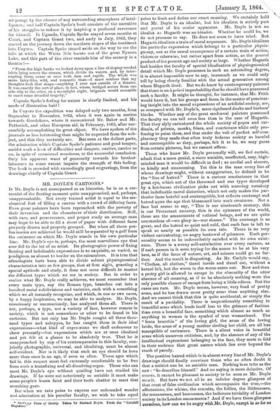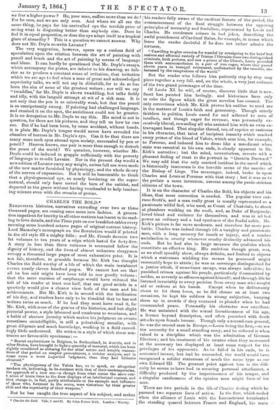MR. DOYLE'S CARTOONS.*
IF Air. Doyle is not unsurpassed as an historian, he is as a car- toonist of the fleeting moment quite unapproached, and, perhaps, unapproachable. Not every trained artist is equal to the me- chanical feat of filling a canvas with a crowd of differing faces. Even great painters have been reproached with the poverty of their invention and the clumsiness of their distribution. Still, with care, and perseverance, and proper study an average man may hope to be able to fill a sheet of paper with different faces properly drawn and properly grouped. But when all these pre- lim Marks are achieved he would still be separated by a gulf from the eminence on which Mr. Doyle stands in his own particular line. Mr. Doyle's eye is, perhaps, the most marvellous eye that ever fell to the lot of an artist. Its photographic power of fixing fleeting and indefinable expressions is so exquisite, so varied, so prodigious, as almost to border on the miraculous. It is true that ethnologists have been able to divide salient physiognomical characteristics into so few groups, that at first sight, granting a special aptitude and study, it does not seem difficult to master the different types which we see in society. But in order to realize what Mr. Doyle really achieves, we must remember that every main type, say the Roman typo, branches out into a hundred social subdivisions and varieties, each with a something which we all instantly recognize, and which, in one or two cases, by a happy inspiration, we may be able to analyze. Mr. Doyle, consciously or unconsciously, has analyzed them all. There is not, perhaps, a type, not a variety of face, however remote in society, which is not somewhere or other to be found in his cartoons. But not only has Mr. Doyle caught all these thou- sand types and subtypes, he has caught them in their ideal expressions—what kind of expressions we shall endeavour to show presently—but expressions which are at once idealized and yet felt at a glance to be absolutely true. That he is unapproached by any of his contemporaries in this faculty, con- jointly photographic, universal, and idealizing, must be almost self-evident. Nor is it likely that such an eye should be born more than once in an age, if even so often. Those ages which fail in this respect must feel extremely comfortable to be free from such a transfixing and all-dissolving organ. Those who can meet Mr. Doyle's eye without quailing have not studied his drawings. If he were not notoriously so amiable it must make some people's knees faint and their teeth chatter to meet that scorching gaze.
But when we take pains to express our unbounded wonder and admiration at his peculiar faculty, we wish to take equal
• Bird's eye rims of Society. Taken by Richard Doyle. From the " Cornhill Magazine."
pains to limit and define our exact meaning. We certainly hold that Mr. Doyle is an idealist, but his idealism is strictly part and parcel of his ocular apparatus. Mr. Doyle is not an idealist as Hogarth was an idealist. Whether he could be, we do not presume to say. He does not seem to have tried. But Hogarth idealizes a train of moral sequences. Mr. Doyle idealizes the particular expression which belongs to a particular physio-
gnomy, not as the moral consequence of a certain train of action, vicious or otherwise, but rather apart from action, as the general
product of the present age and society at large. Whether Hogarth had besides the faculty of special idealisation of physiognomical detail which Mr. Doyle possesses in such an astounding degree, it is almost impossible now to say, inasmuch as we could only tell by being closely familiar with the actual generation among whom Hogarth lived. But we do know by contemporary painters
that there is an a priori improbability that he should have possessed such a faculty. It might be thought, for instance, that Mr. Frith
would have it, but his groups and faces, in the matter of penetrat- ing insight into the moral expressions of an artificial society, are, as compared with Mr. Doyle's, mere signboard daubs and barbers' blocks. Whether any of the great mediaeval painters possessed the faculty we can tell even less than in the case of Hogarth. That they slyly caricatured the whole society of popes and car- dinals, of priests, monks, friars, and courtezaus while only pro- fessing to paint them, and that under the veil of perfect self-com- placency they made that often truly hideous society as hateful and contemptible as they, perhaps, felt it to be, we may guess from certain pictures, but we cannot affirm.
Those who know Mr. Doyle personally will, we feel certain, admit that a more genial, a more amiable, unaffected, easy, high- minded man it would be difficult to find ; so cordial and sincere, so kindly and unassuming. Yet this is the man every line of whose drawings might, without exaggeration, be defined to be the " line of hatred." There is a curious omniscience in that great eye, which out of the thousand and one types developed by a hot-house civilization picks out with unerring certainty that indefinable moral distortion, which not only makes the par- ticular faces hateful and contemptible, but reflects contempt and hatred upon the age that blossomed into such creatures. Not a face but seems to say, " This is our nineteenth century, this is our Protestant country, this is the cynosure of the world, these are the amusements of rational beings, and we are quite unconscious of—we glory in—our shame." The contempt is so great, and the hatred so quiet and cold, that each face is left to speak as nearly as possible its own tale. There is no very
violent caricaturing, no angry bestowal of grimaces. Each per- sonality seems to be indescribably satisfied, with its own exist- ence. There is a sunny self-satisfaction over every cartoon, as if each person in it were trying for the nonce to be at his very best, as if the force of nature, art, and science could go no fur- ther. And the result is disgusting. As Mr. Carlyle would say, "Clothes, all clothes," tinsel inside and tinsel out, without a kernel left, but the worm in the worm-eaten nut. Now and then
a pretty girl is allowed to escape in the obscurity of the utter absence of all meaning, as if to be absolutely nothing were the only possible chance of escape from being a little odious. But the cases are rare. Mr. Doyle seems, however, very fond of pretty arms, and he has drawn more pretty arms than anything else. And we cannot think that this is quite accidental, or simply the result of a partiality. There is unquestionably something in beautiful arms which lends itself less to the grimace of fashion than even a beautiful face, something which almost as much as anything in woman is the symbol of true womanhood. The " lenta bracchia " of the loving girl, the arms of the loving bride, the arms of a young mother circling her child, are all less susceptible of caricature. There is a silent voice in beautiful arms which unnerves criticism, and, by the absence of any of the intellectual expressions belonging to the face, they seem to fold in their embrace that great nature which lies ever beyond the reach of parody.
The positive hatred which is in almost every line of Mr. Doyle's drawings should finally convince those who so often doubt it that a satirist can be an amiable man. Nothing is so trite as the saw : "he describes himself." And no saying is more delusive. Of course, it cannot be pleasant to society to be seen as Mr. Doyle sees it. But have we not all in an inferior degree glimpses of that crust of false civilization which accompanies the true,—the affectations, the whims, the conceits, the follies, the littlenesses, the meaunesses, and basenesses, the ludicrous triviality of London society in its London amusements ? And if we have those glimpses ourselves, how can we be angry with Mr. Doyle, except in so far as we fear a higher power? He, poor man, suffers more than we do For he sees, and we are only seen. And where we all see the same thing, he pays for his unrivalled eye the terrible price of seeing what is disgusting better than anybody else. Does he feel it in equal proportion, or does the eye adapt itself to a tropical glare of absurdity ? This is a question we cannot answer. Why does not Mr. Doyle re-write Lavater?
The very suggestion, however, opens up a curious field of speculation upon the relation between the art of painting with pencil and brush and the art of painting by means of language and ideas. It can hardly be questioned that Mr. Doyle's essays, which accompany the plates, are inferior to his drawing, so infe- rior as to produce a constant sense of irritation, that irritation which we are apt to feel when a man of great and acknowledged superiority talks, we will not say in dishabille, for to do so has been the aim of some of the greatest writers ; nor will we say " twaddles," for Mr. Doyle is above twaddling, but talks feebly and idly, with the languid attempt at wit of a sick man. It is not only that the pen is so miserably weak, but that the pencil is so omnipotently strong. If painting had challenged language, and crushed it on the spot, the anticlimax could not be greater. It is no derogation to Mr. Doyle to say this. His mind is not in question, for there are his pictures, and they tell us how be can see. But if he had been born, by some accident, without hands, it is plain Mr. Doyle's tongue would never have revealed the chamber of horrors in Mr. Doyle's eye. Can it be that there are many more such eyes abroad upon society, unrevealed by pen or pencil ? Heaven knows, one pair is more than enough to disturb the peace of the world I We question, however, whether Mr. Doyle could be induced to grapple sufficiently with the poverty of language to re-edit Lavater. Nor in the present day would a newedition of Lavater carry any weight, unless full use were made of the new matter furnished by physiology, and the whole theory of the nerves of expression. But it will be lamentable to think that a physiognomical eye, so nearly bordering on the super- natural, should only have served the turn of the satirist, and departed to the grave without having vouchsafed to help lumber- ing science even with the crumbs of genius.

















































 Previous page
Previous page